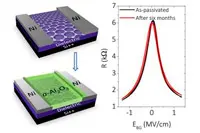 Although graphene based devices have shown outstanding electrical and optical performance, they are sensitive to environmental factors, such as humidity or gas composition. This, says a research team, has made reproducible operation in a normal atmosphere impossible.
Although graphene based devices have shown outstanding electrical and optical performance, they are sensitive to environmental factors, such as humidity or gas composition. This, says a research team, has made reproducible operation in a normal atmosphere impossible.
Generally, adsorbates from the ambient (such as moisture or oxygen) and residuals from lithography processes, adhere to the graphene and change its doping level unintentionally. As these contaminants are unstable under normal conditions, the doping level – and hence the electrical and optical properties – also change. The variation in these parameters is said by the team to be a major roadblock for using graphene devices in applications.
However, the researchers – from AMO and Graphenea – have developed an encapsulation technique that enables graphene devices to demonstrate reproducible operation in a normal atmosphere for several months.
The researchers encapsulated graphene field effect devices using aluminum oxide, an encapsulation material applied in OLEDs. The key parameter for device passivation found in this study is the growth of an oxide layer using a properly in situ oxidised aluminum seed layer. This passivation layer can stabilise device characteristics over several months when stored and measured in ambient atmosphere. This, the team concludes, is a major step towards the use of graphene devices in real applications.
Author
Graham Pitcher
Source: www.newelectronics.co.uk
